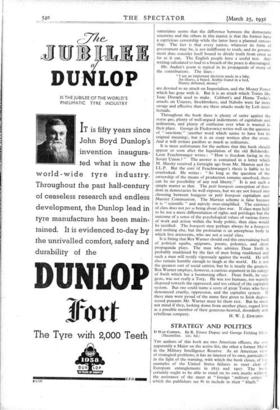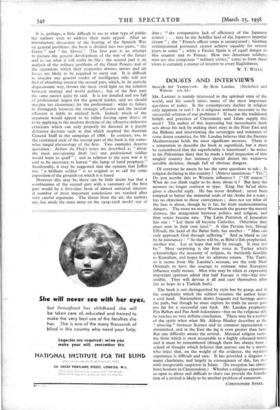STRATEGY AND POLITICS
If War Comes. By R. Ernest Dupuy and George Fielding Eliot. (Macmillan. 12S. 6d.) THE authors of this book are two American officers, the ore apparently a Major on the active list, the other a former Major in the Military Intelligence Reserve. As an American view of strategical problems, it has an interest of its own, particularY in the light of the warning, with which the book closes, of the examples of the United States failures to steer clear of European entanglements in 1812 and 1917. The book certainly ought to be able to stand on its own merits without the assistance of the sneer at " foreign ' military critics
which the publishers see fit to include in their " blurb."
It is, perhaps, a little difficult to see to what type of public the authors wish to address their main appeal. After an introductory discussion of the bearing of the Spanish War on general problems, the book is divided into two parts, " the Game " and " the Moves." The first part is an attempt to picture the general development of the war of the future and to see what it will really be- like ; the second part is an analysis of the military problems of the Great Powers and of the operations which their respective armies, navies and air forces are likely to be required to carry out. It is difficult to imagine any general reader of intelligence who will not find of absorbing interest the second part, whiCh, in its entirely dispassionate way, throws the most vivid light on the relation between strategy and world politics ; but of the first part the same cannot quite be said. It is too detailed and too full of professional jargon for the general reader, and we should imagine too elementary for the professional : while its failure to distinguish between the strategic offensive and the tactical offensive is liable to mislead both. Indeed, much of the argument would appear to be either forcing open doors, or to be applying to the modern doctrine of the offensive-defensive criticisms which can only properly be directed at a purely defensive doctrine such as that which inspired the Austrian General Staff in the campaign of 1866. In contrast, too, to the restrained style of the second part of the book is the some- what turgid phraseology of the first. Two examples deserve quotation : Ardant du Picq's notes are described as " about the most eye-opening draft (sic) any professional soldier would want to quaff " ; and in relation to the next war it is said to be necessary to leaven " the lump of lurid prophecy." Incidentally, it may be suggested that the opinion that Joffre was " a brilliant soldier " is so original as to call for some exposition of the grounds on which it is based.
However this may be, there can be little doubt but that a combination of the second part with a summary of the first part would be a first-class book of almost universal interest. A number of most important conclusions are reached after very careful argument. The threat from the air, the authors say, has made the mass army on the 1914-1918 model out of
date ; " the comparative lack of efficiency of the Japanese aviator . . . may be the Achilles heel of the Japanese imperial dream " ; the " French officer corps is unsurpassed ; German commissioned personnel cannot achieve equality for several years to come " ; while a Fascist Spain is of equal danger to this country and to France. How two American soldiers, who are also competent " military critics," come to form these views is certainly a matter of interest to every Englishman.
W. T. WELLS.











































































 Previous page
Previous page